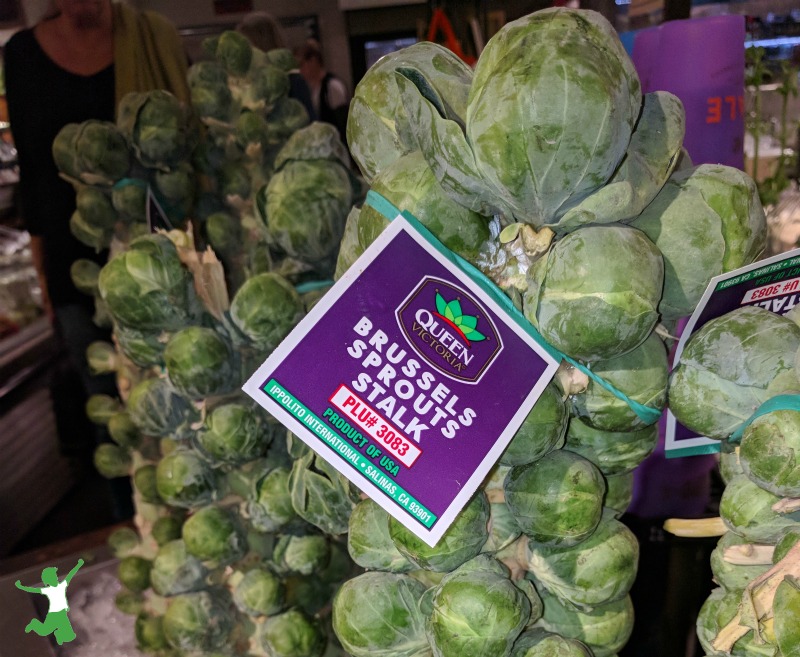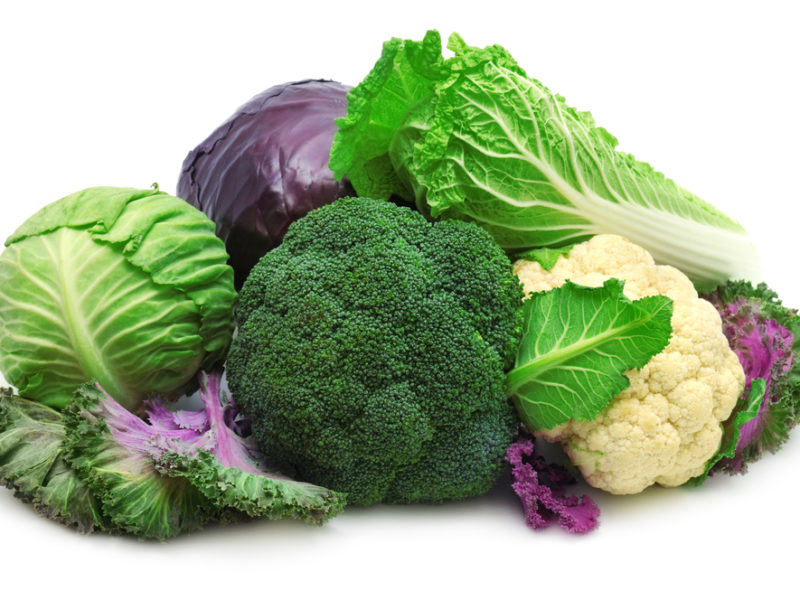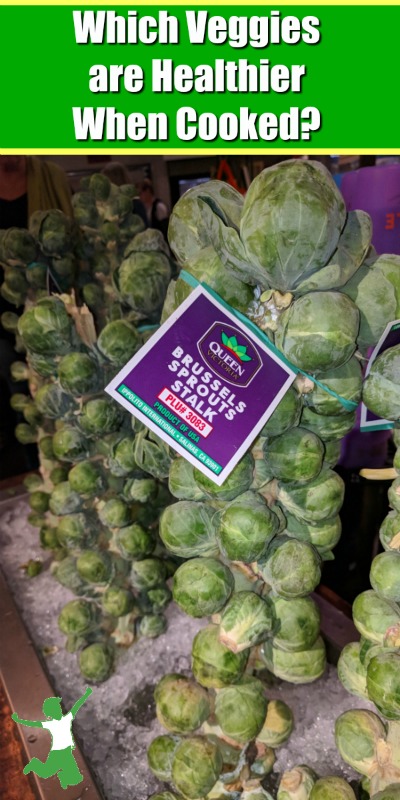Table of Contents[Hide][Show]
Conventional belief is that raw vegetables are always healthier than cooked, but this is not true depending on the plant foods eaten according to lab testing and anthropological evidence by experts in the field.
I stopped by one of my favorite healthfood stores today to pick up a large glass of fresh juice made from organic raw vegetables for an early lunch on the go. As usual, I asked for the a carrot, celery, beet, spinach and cucumber blend. But, hold the spinach. I definitely skipped the green smoothie too!
While this request is usually met with a simple nod by the juice bar attendant, this time the guy looks up and says, “Why no spinach? We have a lot of people that come in here and love the spinach in their juice.”
Ah! Great question!
The truth is that not everything should be eaten raw, especially vegetables!
Some raw vegetables must be cooked else you are actually harming yourself. Below is a rundown of what veggies should not be eaten raw either in whole or juiced form.
Cruciferous Raw Vegetables

Sorry to be the bearer of bad news, but cruciferous vegetables should be cooked before eating as they contain chemicals that BLOCK the production of thyroid hormone in your body! Considering that 2 out of every 3 Westerners are either overweight or obese and this is projected to jump to 75% by 2020, this is of particular importance as folks struggling with weight usually suffer from borderline to full-blown hypothyroidism.
Hypothyroidism is a condition where the thyroid gland does not make enough thyroid hormone, so someone suffering from this condition surely does not want to be eating foods that will block what little thyroid hormone is being produced in the first place!
Symptoms of hypothyroidism include cold hands and feet, thinning hair, fatigue, reduced or nonexistent libido, coarse dry hair, constipation, difficulty losing weight, and depression among many others.
Cooking crucifers reduces the goitrogenic substances by about 2/3. Fermentation does not reduce goitrogens in these veggies, but since fermented crucifers such as sauerkraut are typically eaten as a condiment and, hence, in small amounts, consumption is fine if the diet is rich in iodine.
Here is the list of common cruciferous vegetables that you do not want to be eating raw if you want to protect your thyroid gland!
Arugula, broccoli, kale, maca root, cauliflower, cabbage, turnip, collard greens, bok choy, brussels sprouts, radish, rutabaga, and watercress.
Notice that many of these vegetables are commonly included in fresh veggie juice blends or in salads. While an occasional arugula salad or cup of coleslaw is not going to do harm to most folks, it would be wise not to make a habit of eating/drinking any of these vegetables in raw form. Kale chips are a safe choice too.
Raw Vegetable Greens
Some veggie greens contain a chemical called oxalic acid. This substance is a very irritating to the mouth and intestinal tract. It also blocks iron and calcium absorption and may contribute to the formation of kidney stones.
The good news is that oxalic acid is reduced by a light steaming or cooking. Just be sure to discard the vegetable cooking water.
Veggies containing oxalic acid include spinach, chard, parsley, chives, purslane and beet greens.
Hmmmm. Spinach is known for being high in iron, yet eating it raw will not necessarily give you the iron you want because of the oxalic acid?
Yep, that’s right. Cook that spinach first if you are seeking an iron boost without the indigestion and don’t get hooked on the raw spinach salads!
Don’t stress about munching the parsley garnish on your next gourmet dinner, though. A little bit here and there is not going to cause a problem. Eat a big spinach salad everyday and it is virtually certain you will eventually succumb to kidney stones, according to Dr. William Shaw, Director of The Great Plains Laboratory for Health, Nutrition and Metabolism.
Other Raw Vegetable Cautions
Other vegetables that are best to avoid eating raw include:
- Raw potatoes contain hemagglutinins that disrupt red blood cell function.
- Raw sweet potatoes will give you gas.
- Raw, edible mushrooms such as the common white mushroom contain toxic substances such as agaritine, a suspected carcinogen. These substances are heat sensitive and are neutralized by cooking.
- Raw alfalfa sprouts are mildly toxic and inhibit the immune system. Eating large quantities regularly can make the skin overly sensitive to the sun or trigger autoimmune symptoms that mimic lupus.

Dr. Weston A. Price on Raw Vegetables
A good rule of thumb when considering the best way to consume your veggies is to remember the letter that Dr. Weston A. Price wrote to his nieces and nephews in 1934. In this letter, he strongly urged them to eat their vegetables cooked in butter. His research found that the bulkiness (fiber) of raw vegetables interfered with the human body’s ability to extract minerals from them via the digestive process.
So, should you drink your veggies raw? Of course. Raw vegetable juice made from veggies that are safe to consume uncooked is a wonderful way to get a fast infusion of easy to digest, colloidal minerals. It is also highly alkalizing to the body and a proven way to gently detox the gut.
The great thing about veggie juice is that the fiber is removed, which is the “bulkiness” that Dr. Price found interfered with the mineral absorption.
However, if you are going to eat the fibrous portion of the vegetable, it is best to cook them in butter as advised by Dr. Price to enhance the availability of the minerals. The fat in the butter permits greater absorption of the minerals, and besides, buttered veggies taste fantastic!
References
Nourishing Traditions
The Role of Oxalates in Chronic Disease, William Shaw PhD (Director of The Great Plains Laboratory for Health, Nutrition and Metabolism)
More Information
Best Green Juice for Congestion
Nightshade Vegetable Contraindications
Cleansing Myths








Wow that was well written and filled with alot of information!
I dont know if it is right to say “Eat a big spinach salad everyday and it is virtually certain you will eventually succumb to kidney stones”. Do you have evidence for this assertion?
Yes, that is a quotation from William Shaw PhD (Director of The Great Plains Laboratory for Health, Nutrition and Metabolism). His work is referenced in the article.
Can semi cooked cauliflower is the same as raw
Spinach is NOT a member of the cruciferous group. Get your facts straight please otherwise you just cause more confusion. Spinach (Spinacia oleracea) is an edible flowering plant in the family Amaranthaceae native to central and western Asia. Cruciferous vegetables are in the family Brassicaceae (also called Cruciferae) such as cauliflower, cabbage, garden cress, bok choy, broccoli, and brussels sprouts..
Ummm, I never said that it was! Please re-read the article!
While, cooking may aid digestion and remove some of the oxalates, you seem to be oversensationalizing this supposed phenomenon without providing any peer-reviewed scientific sources to support your argument. Not saying that I necessarily disagree, but it is hard to take this seriously without the aforementioned evidence that is becoming more and more essential to establish credibility in the realm of nutrition. It is unethical to “scare” readers if there is not solid science behind the claim.
Unfortunately, not everything has a peer reviewed article and if you wait until one is available your health will already be harmed by oxalates. The clinical experience as cited in this article by Dr. William Shaw, Director of The Great Plains Laboratory for Health, Nutrition and Metabolism is plenty sufficient to establish the credibility of the information!
Ok… This is a GREAT article Sarah, but I can’t say for sure that it is entirely, absolutely 100% correct… The good news (for me) is that, just via “knowing” what vegetables to cook and which to eat raw (I’ll explain more in a bit, but its kind of like my body is “talking” to me, basically), I’m basically just fine/doing pretty well already… I lightly cook (short time, light heat-water sautée or almond oil, etc. sautée) many/most veggies (that I fairly regularly eat) that need cooking already: kale, collard greens, broccoli, cauliflower, swiss chard, bok choy, even watercress (though with delicate watercress, I esp. try to keep the heat low, or I put watercress not on the bottom of the pan, or, for brief times, on the bottom of the pan to cook it just a tad bit when stirring), and cabbage (red AND green) plus Brussels sprouts I eat less often. And arugula I haven’t really gotten used to, tried it once, but didn’t really care for it much for some reason… I rarely eat radishes (in salads someone else makes)… I don’t really eat turnips, rutabaga, or maka root, but they all sound like they need to be thoroughly cooked before eating… So I’m ok with the thyroid thing I think, so long as I can keep the broccoli, cauliflower, radishes, cabbage (red cabbage still needs to be cooked?), and watercress always cooked, goodness knows some of these guys are thoroughly cooked in stews (radishes, turnips, rutabaga, cabbage, etc.). But what about daikon radish in sushi? Is this not good? I imagine that I don’t eat sushi often enough for this to be an issue (though I do eat sushi probably in spurts, will go for a few months not eating it, then have a month where I eat it a few times, etc.), or the daikon radish in the sushi is so small, that it shouldn’t be much of an issue…
The tricky food here, for me, is spinach… I don’t eat any of the other oxalic acid veggies uncooked, but with spinach, its one of the few veggies that I could either eat cooked or uncooked. The weird thing is (and this is where my body “talking” to me comes into play), I generally will eat raw spinach leaves (for the most part, we are talking about baby spinach from Trader Joes, more in the past) with broccoli and/or cauliflower, bok choy, avocado, cherries, apples, cucumbers, lettuce, grapes, etc., the low oxalate fruits and veggies-I mean, I was eating this way before I even knew it was a nutritional “thing”.: nutriliving.com/nutrition-center/ask-an-rd/11965-i-read-you-shouldnt-eat-raw-spinach-true . Of course, there are tons of nutrition websites that say that its ok eating spinach either raw or cooked, I don’t need to show any links-yeah, it comes down to what nutrients you want from the spinach, I suppose (along with that oxalic acid thing with iron and calcium, but it sounds like there is more at work here than many nutritionists realize with this subject…)…
Other than that loose leaf spinach I just got at PCC natural markets this very week, I’ve always preferred regular (not baby) spinach in its frozen variety, which I can lightly cook with herbs/other veggies, etc. (Baby spinach has less oxalic acid, correct?) I also have never really liked eating button mushrooms raw, but I could never put my finger on it precisely/explain why… Its been ages since I’ve eaten any raw mushrooms, again, that salad thing that I didn’t make that was prepared for me by someone else… Its the same deal with red cabbage… I think, when making fresh salads now (and yes, this topic is getting more interesting now that I think about it a bit more…), I’m going to stick with romaine/green lettuces as the base, maybe iceberg, celery, avocado, cucumber, and maybe carrots, add sunflower seeds sometimes, plus lemon/lime juice, the vinegar/olive oil combo, or an organic fruit/vinegar dressing, etc… I think a lot of folks have the wrong idea about salads incidentally… I think they ideally should be eaten very often, but yeah, they should be fairly basic and not too complicated-esp. because of the info in this article…
And also, I don’t juice veggies. Ever. 😀
Can you share what vegetables are fine to blend in a Vitamix raw for drinking?
This article brings many other vegetables issues to mind. Either cooked or raw, there seems to be as many different opinions as there are verities of vegetables. And there lies the problem. Who to believe.
An added issue is how those veggies are processed (grown, how long they are cooked, pesticides, hormones introduced in the growing process, which ones you can and should eat raw and don’t cook) and the list goes on and on. There was a time when doctors insisted vitamins were like snake oils. At some point in the last 30 years, most now will insist you take some daily regimen of vitamins. What changed? One change is most of us now know that most of our food is poisoned by the growers and producers. Then there is how you cook them. Cooking kills most nutrients you would have benefited from that vegetable. Is there a science here or is all of this as much an unknown as everything else in life?
My husband and I are nearing 70. We have been vegetarians for 45 years. We are healthy and take no prescription meds. We do eat eggs, milk, cheese, yogurt. We have not eaten any fish, poultry, beef, pork, etc. for all those 45 years. I have never felt better in my entire life.
I loved your thoughts about cooking your spinach before eating it to be able to digest it better! Thank you!